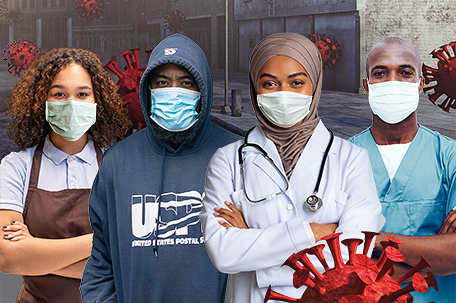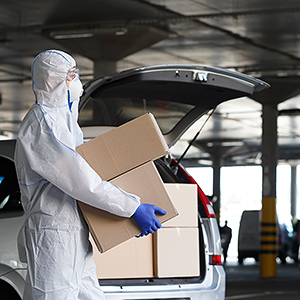
Names have been changed throughout this article to protect workers who wished to remain anonymous.
By Andrea Lawful Sanders
This story began with a text from a friend, who was concerned about the disparate treatment of correctional guards in the Philadelphia prison system. What happened beyond that initial contact opened a labyrinth of firsthand stories from essential workers across the police department, hospitals, and the postal service.
The first call was received from Joseph. He was worried about losing his job, but the importance of what he had to say, and the lives it could possibly save, made the risk worthwhile. As an employee of the prison system, Joseph was concerned about the lack of Personal Protective Equipment (PPE) in his workplace. He maintained that masks were not readily available, the bathrooms were without soap, and that the air is recycled, with the filters being sprayed down instead of replaced.
Joseph and a few others who were brave enough to speak about their working conditions as essential workers are concerned beyond themselves — many have families who have underlying health issues like cancer, hypertension and diabetes. But to date, their pleas for protective gear have mostly fallen on deaf ears.
Thus began a journey which led to many stories from workers on the frontlines amidst the COVID-19 pandemic and quarantine for millions of American citizens.
Philadelphia has been named a coronavirus “hot spot” in recent weeks, with continued reports of essential workers testing positive and about some who have died from the virus. Time after time, we have heard stories of workers needing approval to get an N95 mask — in some cases, while literally watching patients code (cardiopulmonary arrest) in front of them. That is the story of “Sarah,” a nurse who had a patient almost die because the masks were on a different floor and she had to get authorization before obtaining them.
In Sarah’s quest to save her patients’ life, she was exposed. As a mother of small children, she had to quarantine herself from them while still being told she had to continue working until she developed symptoms that would cause her to cease.
It broke Sarah’s heart.
“There is a feeling that we are working 14 hour shifts, often with little to no food, because the cafeteria isn’t always open, and we depend upon the kindness of strangers to either have food delivered or restaurants who are helping in any way they can,” she said.
What is even more heartbreaking for Sarah and her team is that they are not alone.
As a direct result, some employees resigned immediately, citing that the working conditions are too dangerous, and that the risks outweigh the rewards. Others have taken any personal and sick days they may have, so they can stay away while being unsure of what the future may hold for them.

Correctional workers are concerned that while the inmate’s safety have been spoken about vociferously, they have heard little to nothing about those who are working to keep the prisons safe. When one guard requested additional gloves, the guard was told to wash the disposable ones they had and keep working. When other guards chose to bring in masks that they acquired elsewhere for their safety, they were written up for violating the code of standards. “At this point, what choices do we have?” Joseph asked in defeat. “We need people to hear our voices and get us some help!”
I contacted the Public defender’s office and was issued this statement:
“Anyone whose case requires probation, should be identified and a list of recommendations to release them,” Keir Bradford-Grey, chief defender of the Defenders Association of Philadelphia, said in a statement. “The Public Defender’s office has 70% of those cases and we have been working with the District Attorney’s office to expedite [them]. We also need to know who are the inmates with underlying medical conditions in the system — the prisons know who the vulnerable are and can use their own criteria — it has not been done yet, that I am aware of. Pittsburgh is a recent example of every stakeholder coming to the table — Darlene Miller did just that with a list, worked with the judges, DA’s office and the PD’s office to excellent results. We have not done that here in Philadelphia yet.”
Philadelphia Prison Commissioner Blanche Carney’s office offers a link providing updated information about, what is being done within the system:. https://www.phila.gov/2020-03-30-how-philadelphia-department-of-prisons-is-responding-to-covid-19/
District Attorney Larry Krasner, responded to the prison situation with this statement on April 8.
“Pennsylvania continues to lag behind other states in safely reducing county jail and state prisons populations, just as we have confirmation of COVID-19 cases in all 67 counties,” Krasner said in the statement. “A Philadelphia police officer, three SEPTA employees, and health care professionals are among the 310 confirmed deaths, and residents have been instructed to brace for the pandemic’s peak here.The time to act in order to save lives was three weeks ago, but we can still prevent a lot of harm by acting right now. State correctional facilities are hotbeds for the rapid spread of coronavirus, and if there are outbreaks in these facilities there will soon be outbreaks outside of them in our communities. We must prevent from happening in Pennsylvania what has been happening at New York’s Rikers Island, where COVID-19 has been spreading more than 85 times faster than the average rate of infection in the U.S.”
As of press time, The Pennsylvania Department of Corrections (PADOC) to date has confirmed three inmates have tested positive for COVID-19 in two counties, but has not disclosed the facilities where correctional workers and staff have tested positive. Approximately 45,000 people, of whom roughly 12,000 are considered by the PADOC to be vulnerable due to age or health, are housed in 25 state prisons. All four ventilators owned by the PADOC are currently in use, according to media reports.
Also, Dr. Rachel Levine, Pennsylvania’s State Health Commissioner, signed an order mandating protective equipment for all essential workers. That equipment includes masks, gloves and other equipment. To view Secretary Levine’s order as a PDF go to this link: https://www.governor.pa.gov/wp-content/uploads/2020/04/20200415-SOH-worker-safety-order.pdf or www.scribd.com. For the most up-to-date information on COVID-19, visit https://www.pa.gov/guides/responding-to-covid-19/
So now what? There seems to be a lack of transparency from some leaders, while others are standing boldly to support these essential workers and mitigate the numbers of people who are sick and being sent to hospitals like the one where Sarah works. The nurses and doctors on the front lines are doing their very best to ensure quality care for their patients while trying to stay safe themselves in an environment where inconsistent access to PPE gear is both frustrating and frightening.

















Leave a Comment